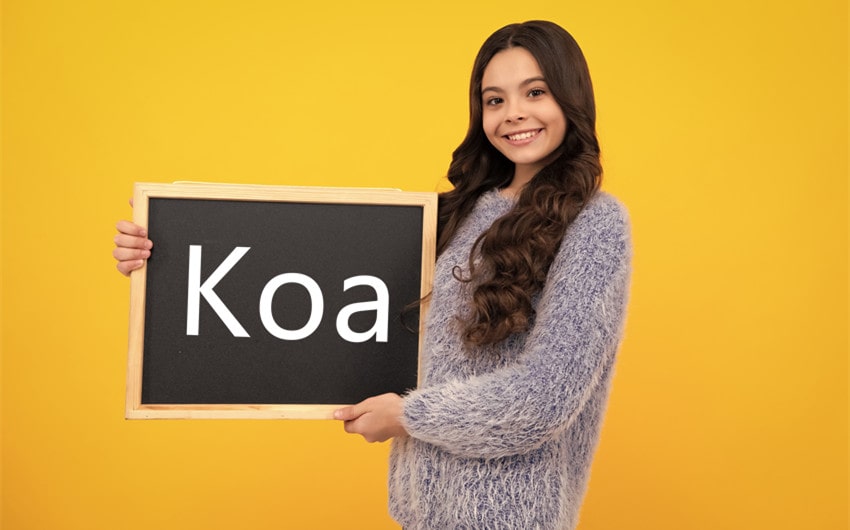Koa Name Meaning and Its Connection to Hawaiian Culture
The name Koa has been steadily rising in popularity, and it’s easy to see why. With roots deeply embedded in Hawaiian culture, Koa carries a sense of strength and bravery that resonates with many. If you’re curious about the Koa name meaning, you’ll find that it’s not just a name but a reflection of resilience and courage.
Whether you’re considering it for your child or simply exploring unique names, understanding the meaning of Koa can provide valuable insight into its appeal and significance.
Origin, Etymology, and Meaning of Koa

Historical and Cultural Background
The name Koa originates from Hawaiian culture, where it has been cherished for generations. In Hawaii, names are deeply meaningful, often reflecting the individual’s personality, lineage, or the circumstances surrounding their birth. Koa, in particular, holds a significant place in this tradition, symbolizing strength, bravery, and resilience.
Historically, Koa was used to describe warriors—those who displayed not only physical strength but also the inner fortitude required to protect their communities and uphold their values. This name is a tribute to the warrior spirit that was vital in Hawaiian society, where courage and steadfastness were highly esteemed.
In addition to its association with warriors, the name Koa is closely linked to the Koa tree, a species native to the Hawaiian Islands. The Koa tree is renowned for its strong, durable wood, which was traditionally used by Native Hawaiians to craft canoes, weapons, and tools. The tree’s resilience and utility mirror the qualities that the name Koa embodies, making it a symbol of strength, durability, and connection to the natural world.
Etymology and Literal Meaning
The etymology of Koa is rooted in the Hawaiian language, where it literally translates to “warrior” or “brave one.” This simple yet powerful word encapsulates the essence of courage and resilience, traits that are highly valued in Hawaiian culture. The name suggests an individual who possesses not just physical might but also the inner strength to face challenges and adversity with determination.
Symbolic and Contemporary Significance
Beyond its literal translation, Koa carries deep symbolic meaning in Hawaiian culture. The name is imbued with the mana, or spiritual energy, of courage, protection, and strength. It reflects the enduring legacy of the warriors who protected their land and people, as well as the vital role that the Koa tree plays in Hawaiian life. This connection to nature highlights the importance of resilience and resourcefulness, qualities that are as relevant today as they were in the past.
In contemporary times, the name Koa has gained popularity beyond Hawaii, resonating with people from various backgrounds who are drawn to its strong, positive connotations. It represents not only the ideal of a warrior but also the values of leadership, integrity, and environmental stewardship. The association with the Koa tree has also taken on new significance, reflecting a growing awareness of sustainability and the importance of preserving natural resources.
Variations of Koa
The name Koa, while uniquely Hawaiian in its origins, has inspired several variations and related names across different cultures and languages. These variations, though distinct in form, often retain similar meanings or reflect the same values of strength, courage, and resilience that are central to the name Koa. Below are some of the most notable variations and related names:
1. Koah
- Language/Culture: English Adaptation
- Details: Koah is a slightly altered version of Koa, primarily used in English-speaking countries. The addition of the “h” at the end softens the pronunciation slightly while retaining the core meaning of “warrior” or “brave one.” This variation offers a subtle twist on the original name, making it a unique yet familiar choice for parents looking for something distinct but still rooted in the original Hawaiian meaning.
2. Noah
- Language/Culture: Hebrew, English
- Details: While Noah is a name with entirely different origins—derived from the Hebrew word “Noach,” meaning “rest” or “comfort”—it shares phonetic similarities with Koa. In some contexts, particularly in English-speaking countries, Noah is seen as a related name due to its similar sound. Though the meanings differ, both names have become popular choices, and their shared phonetic qualities make them an interesting pair.
3. Toa
- Language/Culture: Polynesian, Maori
- Details: Toa is a name used in various Polynesian cultures, including Maori, where it also means “warrior” or “brave one.” Toa is closely related to Koa not only in meaning but also in cultural significance. In Maori culture, as in Hawaiian, the concept of a warrior is deeply respected, and the name Toa is a powerful representation of this ideal. It is a strong, simple name that carries the same warrior spirit as Koa.
4. Koaia
- Language/Culture: Hawaiian
- Details: Koaia is a less common variation of Koa, also found in Hawaiian culture. This name may refer to a smaller species of the Koa tree, known scientifically as Acacia koaia. While it is primarily associated with the natural world, Koaia retains the strong, resilient qualities of the original name Koa, making it a meaningful variation with a slightly different emphasis.
5. Koh
- Language/Culture: Japanese, Chinese
- Details: Koh is a name found in Japanese and Chinese cultures, though it has different meanings depending on the kanji or characters used. In Japanese, Koh (光) can mean “light” or “brightness,” while in Chinese, it might have various meanings based on the character. Though not directly related to Koa in meaning, Koh shares a similar short, strong phonetic structure and is often appreciated for its simplicity and elegance.
6. Kawika
- Language/Culture: Hawaiian
- Details: Kawika is a Hawaiian variation of the name David, which means “beloved.” While not a direct variation of Koa, Kawika shares cultural and linguistic roots with Koa, reflecting Hawaiian naming traditions that emphasize strength, honor, and family ties. Kawika is a longer, more traditional Hawaiian name that carries a similar cultural resonance.
7. Kai
- Language/Culture: Hawaiian, Japanese, Maori
- Details: Kai is a name that appears in various cultures with different meanings. In Hawaiian, Kai means “sea,” symbolizing the natural world’s power and beauty. In Maori, it can mean “food” or “meal,” and in Japanese, it can mean “ocean” or “shell.” While Kai is not a direct variation of Koa, it shares cultural significance and a connection to nature, making it a related name in spirit.
8. Koan
- Language/Culture: Zen Buddhism (Japanese)
- Details: Koan is a term used in Zen Buddhism to describe a paradoxical question or statement used in meditation practice. Although Koan is not directly related to the name Koa, it shares the same phonetic beginning and carries a sense of contemplation and depth. Koan’s spiritual connotations make it a meaningful name choice, particularly for those interested in Eastern philosophies.
9. Kaia
- Language/Culture: Hawaiian, Scandinavian
- Details: Kaia is a name that has different meanings depending on the culture. In Hawaiian, it can be seen as a variation of Kai, meaning “sea,” while in Scandinavian cultures, Kaia is a variation of Kaja, meaning “pure.” Though Kaia is more commonly used as a feminine name, it shares the phonetic simplicity and connection to nature that Koa embodies.
10. Loa
- Language/Culture: Hawaiian
- Details: Loa is a Hawaiian name meaning “long” or “tall,” often used in the context of “Mauna Loa,” which means “Long Mountain,” one of the most significant volcanoes in Hawaii. While Loa is not a direct variation of Koa, it shares the same linguistic origin and reflects a connection to the land and nature, similar to Koa.
Popularity of the Name Koa

The name Koa, while deeply rooted in Hawaiian culture, has transcended its regional origins and gained popularity across the world, particularly in English-speaking countries. This global appeal is largely due to the name’s simplicity, its strong and positive connotations, and its connection to nature and bravery. Let’s take a closer look at the popularity of Koa in various regions:
United States: In the United States, Koa has seen a significant increase in popularity over the past decade. Originally more common in Hawaii, where it has always been a cherished name, Koa began gaining traction on the mainland in the early 2000s. This rise can be attributed to several factors, including a growing interest in unique, culturally rich names, as well as a broader appreciation for Hawaiian culture. By the 2010s, Koa had become a popular choice among parents seeking a short, strong name with deep meaning. It has consistently climbed the baby name charts and now ranks among the top 500 names for boys in the U.S., with increasing usage for girls as well.
Hawaii: In its native Hawaii, Koa has long been a popular and respected name, symbolizing strength and courage. It has remained a traditional name choice for boys, deeply connected to the island’s cultural heritage. The name Koa is not only popular as a first name but also as a middle name, where it carries the same significance. Given its cultural importance, Koa remains one of the most common names in Hawaii, representing the enduring values of Hawaiian tradition.
Australia and New Zealand: In Australia and New Zealand, Koa has also gained popularity, particularly in communities that value outdoor lifestyles and connection to nature. The name’s association with strength and the natural world resonates well in these regions, where environmental consciousness and appreciation for indigenous cultures are strong. While Koa is not yet as common as in the United States, its usage is steadily increasing as parents seek out names that are both meaningful and distinctive.
United Kingdom: In the United Kingdom, the name Koa is still relatively rare but has been gaining recognition, especially among parents who favor short, punchy names with strong meanings. As global trends in baby names often influence the UK, Koa is expected to continue growing in popularity as more parents discover its appeal.
Canada: Similar to trends in the United States, Koa is becoming increasingly popular in Canada. The name’s straightforward pronunciation and its connection to strength and nature have made it appealing to Canadian parents. As Canada is home to diverse cultures, names that are unique yet carry a sense of heritage and meaning are often favored, contributing to Koa’s rising popularity.







